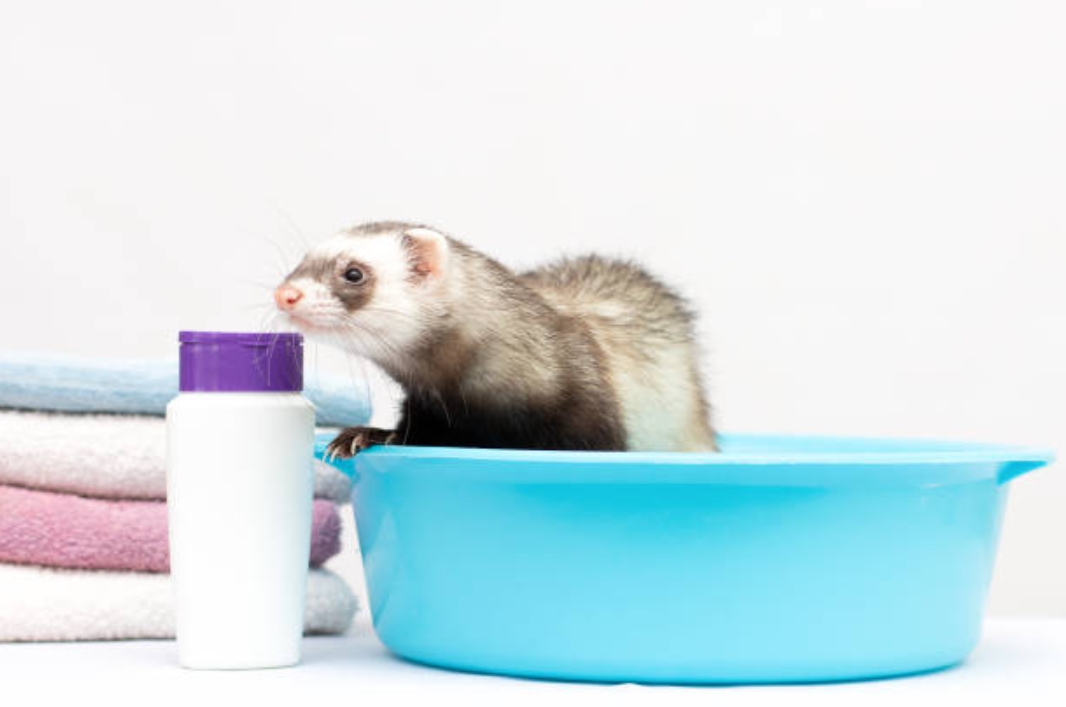Keeping your ferret looking and feeling its best is an important part of being a responsible pet owner. Ferrets have a unique coat that requires ferret grooming regularly to stay healthy and shiny. While some owners may find grooming their ferret to be a challenge, it doesn’t have to be. In this article, we’ll provide you with expert tips and tricks for making ferret grooming easy and stress-free. From bathing and brushing to nail trimming and teeth cleaning, we’ll cover everything you need to know to keep your ferret looking and feeling great. So, grab your grooming tools, and let’s get started!
Why Ferret Grooming is Important?
Ferrets Grooming is an essential part of keeping your ferret healthy and happy. Ferrets have a unique coat that requires regular grooming to maintain its shine and texture. Grooming helps to prevent hairballs, reduce shedding, and keep your ferret’s skin clean and healthy. It also helps you detect any skin problems or abnormalities early on, so you can seek veterinary care if necessary. Regular grooming also strengthens the bond between you and your ferret, as it provides an opportunity for you to spend quality time together.
How to Take Care of a Ferret: 7 Essential Tips for Beginners
Benefits of Proper Grooming
Proper grooming offers several benefits for your ferret, including improved hygiene and health. Regular grooming prevents matting and tangling of the coat, which can be uncomfortable for your pet. Brushing and combing help to distribute natural oils throughout your ferret’s coat, which keeps it soft and shiny. Grooming also helps to remove dirt, debris, and loose hair from your ferret’s coat, reducing the risk of hairballs and other digestive problems. Additionally, proper grooming helps to prevent fleas, ticks, and other parasites from infesting your pet’s fur. Overall, regular grooming is a key component of maintaining your ferret’s health and well-being.
Ferret Grooming Basics
Ferret Grooming your ferret is an important part of ferret care that can help keep your pet healthy and comfortable. Before you start grooming your ferret, it’s important to understand your ferret’s coat and skin. Ferrets have a short, dense coat that sheds seasonally. Their skin is delicate and sensitive, which means you need to be gentle when grooming your pet.
Understanding Your Ferret’s Coat and Skin
Ferrets as Pets: 101 The Ultimate Guide to Understanding Your Furry Friends
Your ferret has two layers of fur that protect them from the cold. The undercoat is thick and helps to insulate the body. The guard hairs are the longer, coarser fur on top that protects their skin. Ferret’s skin is sensitive, and it’s important to be gentle when you’re grooming them. When you’re petting your ferret, try to feel for any bumps or lumps that could be a sign of a problem.
Grooming Tools You’ll Need
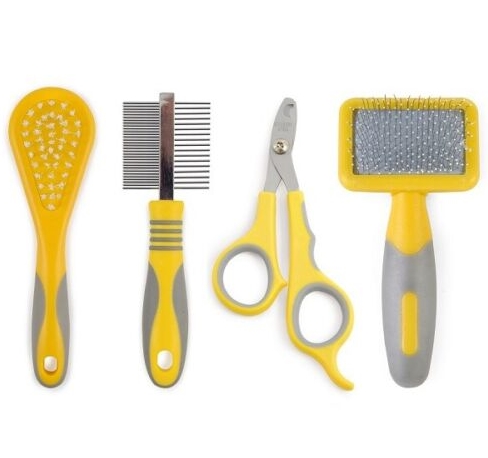
There are some basic tools you’ll need to groom your ferret. A soft-bristled brush is best for getting rid of loose fur and dirt. A comb can help untangle any knots or mats in their fur. You’ll also need to clip your ferret’s nails regularly to keep them at a safe length. Ferret-specific shampoo and conditioner can help keep their skin clean and healthy.
How Often to Groom Your Ferret?
How often you groom your ferret depends on their fur length. If your ferret has short hair, you only need to groom them once a week. If they have long hair, you might need to groom them every day to prevent tangles and matting. During shedding season, which usually happens twice a year, you might need to groom them more often to remove loose fur.
For example, my ferret, Fluffy, has long hair, so I groom her every day to keep her coat looking nice. She loves to play in the dirt, so I use a soft brush to remove the dirt and any loose fur. I also use a comb to gently work through any knots or mats. When it’s time to clip her nails, I wrap her in a blanket to keep her calm while I trim her nails.
By following these tips, you can keep your ferret healthy and happy. Keep reading What Do Ferrets Eat: Ferret’s Healthy Diet
Bathing Your Ferret
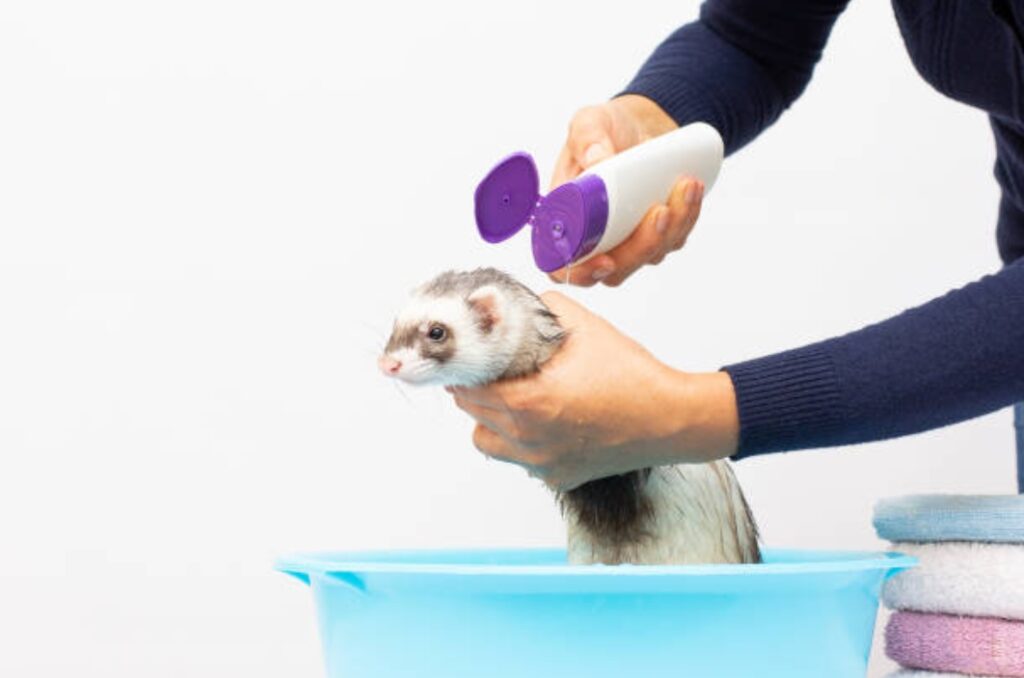
Bathing your ferret refers to the process of cleaning your ferret’s coat and skin by giving them a bath in water and shampoo. It’s an important part of their grooming routine and can help keep their skin and coat healthy. However, because ferrets have delicate skin, it’s important to use a ferret-specific shampoo and conditioner and to be gentle during the bath to avoid causing any skin irritation.
Preparing for the bath:
To give your ferret a bath, you should gather everything you need before you start. You will need a small towel, a soft-bristled brush, and a special ferret shampoo and conditioner. Ferrets have sensitive skin, so you should use a shampoo and conditioner made specifically for them. Fill a sink or small basin with warm water. Make sure the water is not too hot, or it could hurt your ferret.
Tips for bathing your ferret:
To start, wet your ferret’s coat with warm water. Apply a small amount of shampoo to your hands, and gently rub it into your ferret’s fur. Be careful not to get the shampoo in your ferret’s eyes or ears. Rinse your ferret thoroughly with warm water, making sure to get all the soap off. Apply a small amount of conditioner to your ferret’s fur, and rinse again. Be sure to check your ferret’s skin for any dry patches or sores.
Ferret Shampoo common brands:
There are several brands of shampoo specifically made for ferrets that are safe and effective to use. Some common brands of ferret shampoo include:
- Marshall Pet Products
- Kaytee
- Eight in One
- Super Pet
- Nature’s Miracle
- Oasis
- Four Paws
- 8 in-1 Pet Products
- Bio-groom
- Earthbath
Ferret Conditioner common brands
There are some common brands of ferret conditioner that you can consider:
- Marshall Ferret Coat Conditioner
- 8 in 1 Ferretsheen Deodorizing Coat Conditioner
- Bio-Groom Silk Creme Rinse Conditioner
- Ferret RX Leave-On Conditioner
- Kaytee Slick N Easy Grooming Spray
- Zilla Reptile Terrarium Bedding Substrate Liner
- Hagen Living World Shampoo & Conditioner
- Nupro All-Natural Ferret Supplement
- Tropiclean Fresh Breath Water Additive
- Groomer’s Edge Alpha White Shampoo
Remember to always read the labels and choose a product that is specifically formulated for ferrets. It’s also a good idea to consult with your veterinarian for recommendations based on your ferret’s specific needs.
Ferret as a Pet: 3 Secret Pros and Cons Before Having Ferret at Home
Drying and brushing your ferret after the bath:
After the bath, wrap your ferret in a small towel to dry them off. Gently pat your ferret dry with the towel, being careful not to rub too hard or cause any tangles in their fur. Once your ferret is mostly dry, use a soft-bristled brush to gently comb through their fur. This will help remove any remaining water and any tangles or mats. Be sure to dry your ferret thoroughly to avoid any skin irritation.
Brushing Your Ferret
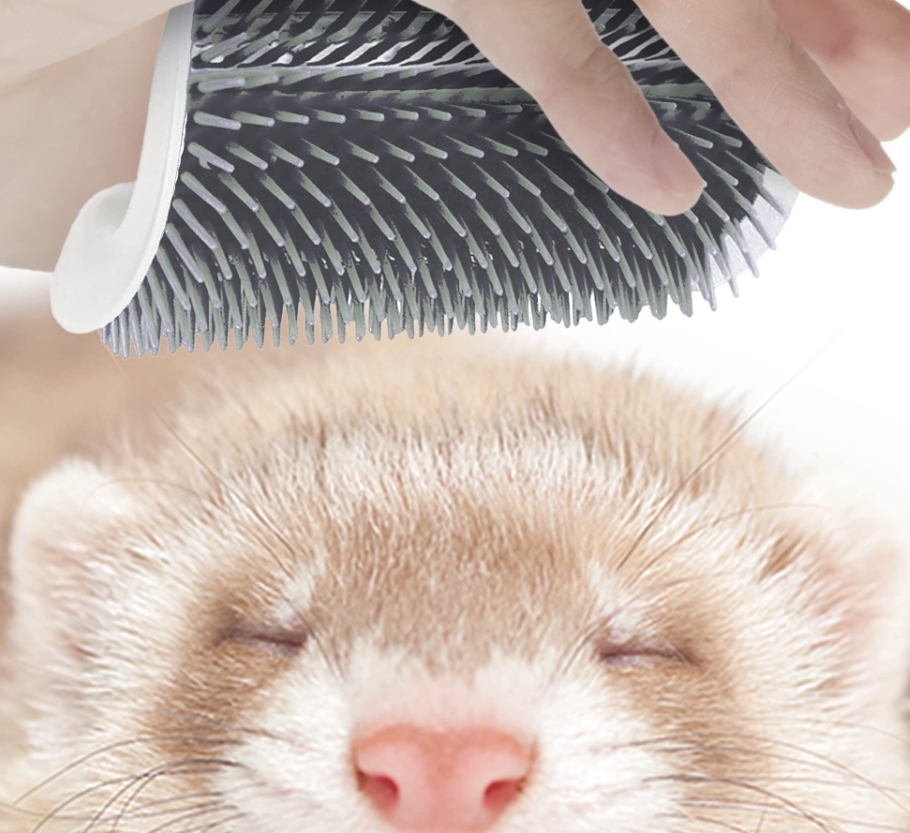
Brushing your ferret is an important part of their grooming routine, as it helps to remove any loose hair, dirt, or debris from their coat and helps to distribute the natural oils in their skin. Brushing your ferret regularly can also help to prevent hairballs and keep its coat healthy and shiny.
How to brush your ferret’s coat:
To brush your ferret’s coat, you should start by getting a soft-bristled brush or comb made specifically for ferrets. Begin by gently brushing your ferret’s back and sides, working your way down to its legs and tail. Be careful around their sensitive areas like their face, ears, and paws. You should brush your ferret’s coat at least once a week to keep it healthy and shiny.
Tips for detangling and removing mats:
If you find any tangles or mats in your ferret’s coat, you should try to gently work them out with your fingers or a comb. Be careful not to pull too hard or hurt your ferret. If the tangles are particularly stubborn, you can use a pair of scissors to cut them out, but be careful not to cut your ferret’s skin. Regular brushing can help prevent mats from forming in the first place.
Types of brushes and combs to use:
There are different types of brushes and combs that you can use for your ferret, including soft-bristled brushes, slicker brushes, and flea combs. Soft-bristled brushes are great for everyday grooming and detangling. Slicker brushes are good for removing loose hair and mats. Flea combs are useful for removing fleas and flea dirt from your ferret’s coat. You should choose a brush or comb that works best for your ferret’s coat type and grooming needs.
Ferret Nail Trimming
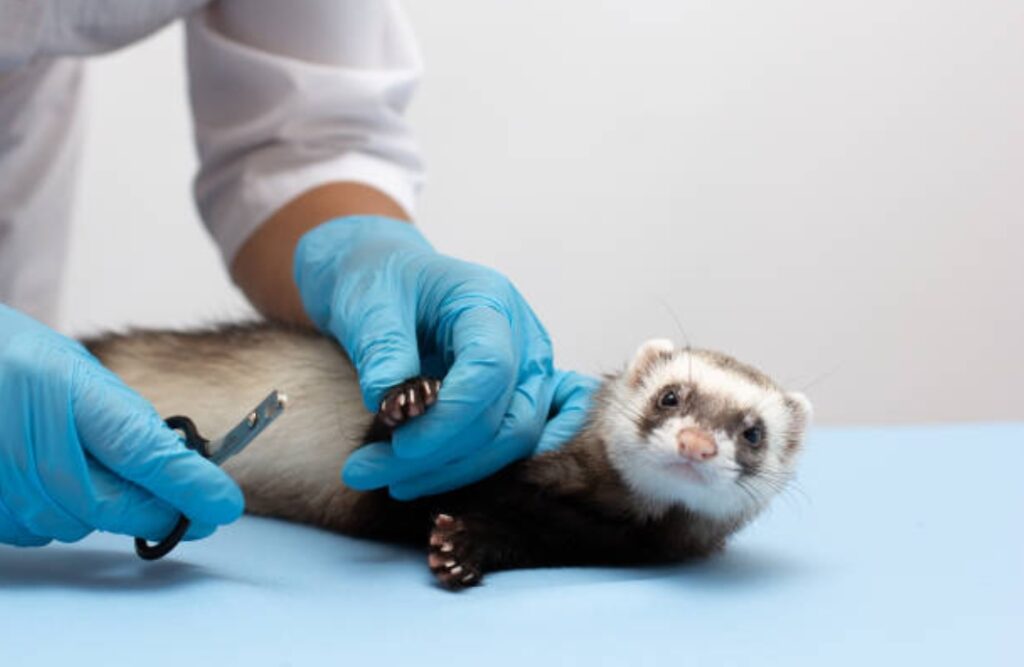
Nail trimming is the process of trimming your ferret’s nails to keep them at an appropriate length. Overgrown nails can cause discomfort, pain, and even injury to your ferret or you. Regular nail trimming is an important part of your ferret’s grooming routine to ensure they are healthy and happy.
How to Train a Ferret: Effective Ferrets Training Tips and Tricks
Why Nail Trimming Is Important:
Nail trimming is important for your ferret’s health and well-being. Overgrown nails can cause pain and discomfort while walking or playing, and can also lead to nail breakage, which can be very painful. Regular nail trimming can also help to prevent your ferret from scratching or injuring you or other pets.
How to Trim Your Ferret’s Nails:
To trim your ferret’s nails, you will need a pair of ferret-specific nail clippers, a towel or blanket to wrap your ferret in, and some treats to reward good behavior. Gently wrap your ferret in the towel, exposing only one paw at a time. Hold the paw firmly but gently, and use the clippers to trim just the tip of the nail, being careful not to cut into the quick (the pink part inside the nail). If your ferret has clear nails, you can see the quick, but if they have dark nails, it can be harder to see, so only trim a little bit at a time.
Tips for Keeping Your Ferret Calm During Nail Trims:
Some ferrets may be nervous or frightened during nail trims, so it’s important to take it slow and make the experience as positive as possible. Offer your ferret some treats to distract them and reward them for good behavior, and talk to them in a calm and reassuring tone. If your ferret is very nervous, you may want to enlist the help of a friend or family member to hold them still while you trim their nails. It’s also a good idea to make nail trimming a regular part of your ferret’s grooming routine so they become more comfortable with it over time.
If you are wondering what Ferret treats you should give to calm your Ferret, here are some examples of treats you can give to your ferret:
- Ferret-specific treats available at pet stores
- Cooked meats such as chicken or turkey (avoid seasoning)
- Raw or cooked egg (avoid seasoning)
- Pieces of raw or cooked liver
- Small amounts of fruits like bananas or strawberries
- Freeze-dried meat treats
- Ferret-friendly soft chew treats
- Small amounts of cooked pasta
- Ferret kibble treats
- Yogurt or cottage cheese in moderation
Remember to always give treats in moderation, and consult with your veterinarian if you have any concerns about your ferret’s diet.
Ferret Ear Cleaning
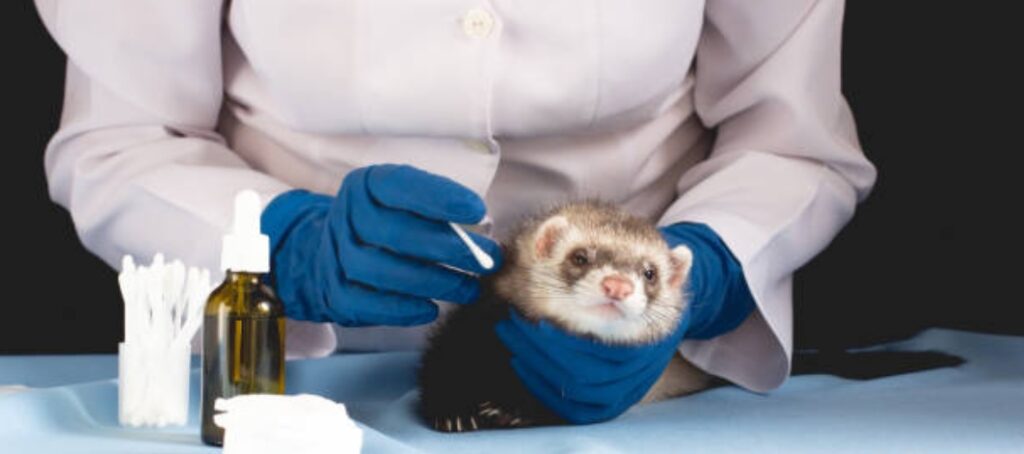
Ear cleaning for ferrets involves removing dirt and wax buildup from their ears to prevent infections and discomfort. It is an important part of your ferret’s hygiene routine, as they have very sensitive ears and can easily develop ear infections. Regular ear cleaning can help prevent these issues and keep your ferret healthy and happy.
Why Ear Cleaning is Important for Ferrets
Ferrets have sensitive ears that are prone to developing infections, making ear cleaning a crucial part of their grooming routine. When wax and debris build up in a ferret’s ears, it can lead to ear infections, which can be painful and uncomfortable. Regular ear cleaning can help prevent these infections and keep your ferret’s ears healthy.
How to Clean Your Ferret’s Ears
To clean your ferret’s ears, you’ll need a clean, damp cloth, cotton swabs, and an ear-cleaning solution. First, hold your ferret securely and gently wipe the inside of its ear flap with the cloth to remove any dirt or wax buildup. Then, use a cotton swab or ear-cleaning solution to clean the ear canal. Be careful not to insert the cotton swab too far into the ear canal, as this can cause damage.
Tips for Preventing Ear Infections
In addition to regular ear cleaning, there are other steps you can take to prevent ear infections in your ferret. Keep their environment clean and free of debris, and avoid exposing them to loud noises, which can damage their hearing. If you notice any signs of infection, such as redness or discharge, take your ferret to the vet right away. By following these tips and regularly cleaning your ferret’s ears, you can help keep them healthy and happy.
Teeth Cleaning
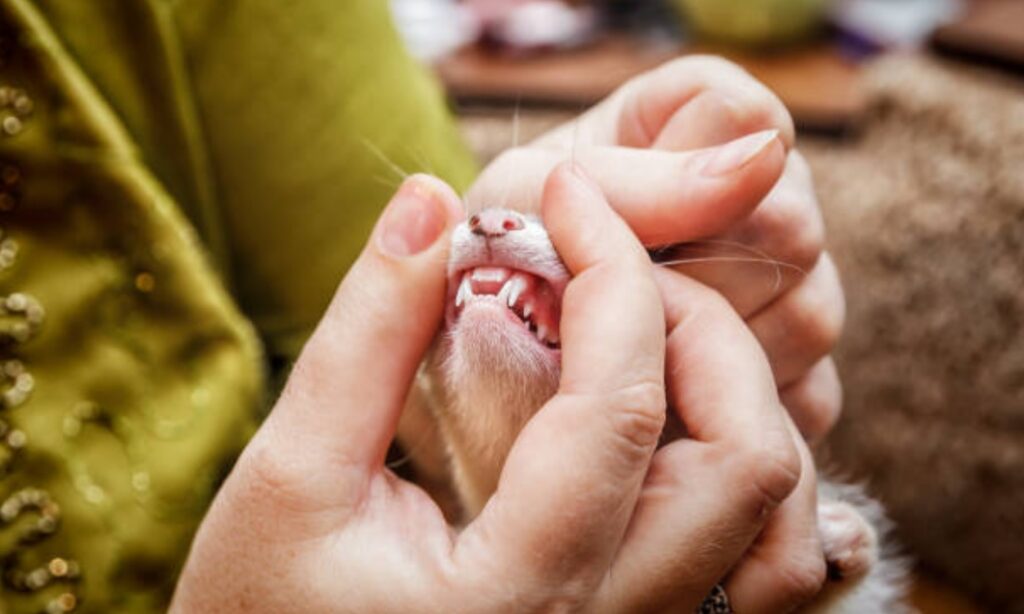
Ferrets are prone to dental issues like plaque buildup, tartar, and gum disease, which can lead to tooth decay and even tooth loss if left untreated. Regular teeth cleaning can prevent these problems and ensure your ferret has healthy teeth and gums.
Why Teeth Cleaning is Important?
As a ferret owner, it’s important to keep your furry friend’s teeth clean and healthy. Just like humans, ferrets can develop dental problems if their teeth are not properly cared for. These problems can lead to pain, difficulty eating, and even infections. Regular teeth cleaning can prevent these issues and keep your ferret’s teeth strong and healthy.
How to Clean Your Ferret’s Teeth
Cleaning your ferret’s teeth may seem like a daunting task, but it’s actually quite simple. You can use a small toothbrush or even a piece of gauze wrapped around your finger to gently clean your ferret’s teeth. Be sure to use only toothpaste that is specifically made for ferrets, as human toothpaste can be harmful to them. Gently brush the teeth and gums in a circular motion, being careful not to apply too much pressure.
Tips for Maintaining Good Dental Health
In addition to regular teeth cleaning, there are other things you can do to maintain your ferret’s dental health. Providing your ferret with chew toys and bones can help keep their teeth strong and clean. It’s also important to feed them a healthy diet that is low in sugar and high in protein. If you notice any signs of dental problems, such as difficulty eating or bad breath, be sure to take your ferret to the vet for a check-up.
Advanced Grooming Techniques
Advanced Grooming Techniques include trimming and styling your ferret’s coat, as well as using supplements to improve their coat and skin health.
Trimming your ferret’s fur
Trimming your ferret’s fur can be done for both aesthetic and practical reasons. Long-haired ferrets may need to have their fur trimmed to prevent matting or to keep them cool during hot weather. To trim your ferret’s fur, use a pair of small scissors and trim the fur around the ears, paws, and rear end. Be careful not to cut your ferret’s skin, and use treats to keep them calm and still during the process.
Styling your ferret’s coat
Styling your ferret’s coat can be a fun way to showcase their unique personality. You can use small hair accessories, such as bows or clips, to add a little flair to your ferret’s look. Make sure the accessories are securely fastened and do not cause any discomfort to your ferret. Additionally, you can use pet-safe hair dye to give your ferret a pop of color. However, always make sure to follow the instructions carefully and do a patch test before applying to your ferret’s whole coat.
Using supplements to improve coat and skin health
Using supplements, such as fish oil or vitamin E, can help improve the health and appearance of your ferret’s coat and skin. These supplements can help reduce dryness, itching, and flaking. Additionally, a healthy diet rich in protein and essential nutrients can also contribute to a healthy coat and skin. Always consult with your veterinarian before giving your ferret any supplements, and follow the recommended dosage.
Remember, while advanced grooming techniques can be fun and beneficial for your ferret, always prioritize their comfort and well-being. Ferret Grooming: most relevant content around the net thesprucepets.com, be.chewy.com, friendlyferret.com, ferret.com, petplace.com.
Most Common Questions and Answers for Ferret Grooming
Sure, here are some common questions about ferret grooming and their answers in more detail:
- How often should I groom my ferret?
- Answer: It is recommended to groom your ferret at least once a week to maintain their coat’s health and cleanliness. However, if your ferret has a longer coat or sheds more, you may need to groom them more frequently.
- How do I bathe my ferret?
- Answer: You can bathe your ferret by filling a sink or tub with lukewarm water and using a ferret-specific shampoo. Be sure to avoid getting water or soap in their ears, nose, and eyes. After the bath, dry your ferret with a towel and a hairdryer on low heat.
- How do I trim my ferret’s nails?
- Answer: You can use a small, sharp pair of nail clippers to trim your ferret’s nails. Hold their paw gently and trim only the tip of the nail, being careful not to cut the quick (the pink part inside the nail). You may need to do this every 2-4 weeks.
- What types of brushes and combs are best for ferrets?
- Answer: Ferrets have a short, dense coat that requires a soft-bristled brush or comb to avoid hurting their skin. A slicker brush or rubber brush can also help remove loose fur and mats.
- How do I clean my ferret’s ears?
- Answer: You can use a cotton ball or pad moistened with a ferret-specific ear cleaner to clean the inside of your ferret’s ears. Be sure to avoid pushing anything deep into the ear canal, and gently wipe away any debris.
- Can I trim my ferret’s fur at home?
- Answer: Yes, you can trim your ferret’s fur at home using scissors or electric clippers with a #10 blade. Be sure to avoid cutting their skin, and use caution around their sensitive areas like the face and ears.
- How do I prevent my ferret’s coat from getting oily?
- Answer: You can prevent your ferret’s coat from getting oily by not over-bathing them and using a ferret-specific dry shampoo between baths. You can also feed them a high-quality diet and avoid feeding them fatty or oily treats.
- How do I prevent my ferret from getting hairballs?
- Answer: You can prevent your ferret from getting hairballs by brushing them regularly to remove loose fur and feeding them a high-fiber diet. You can also give them hairball remedies or supplements as recommended by your veterinarian.
- Can I use human grooming products on my ferret?
- Answer: No, you should not use human grooming products on your ferret. Ferrets have sensitive skin and can have adverse reactions to products made for humans. Always use ferret-specific grooming products.
- How can I improve my ferret’s coat and skin health?
- Answer: You can improve your ferret’s coat and skin health by feeding them a high-quality diet, providing them with clean bedding and litter, grooming them regularly, and using supplements like omega-3 fatty acids or biotin as recommended by your veterinarian.
Why Do Ferrets Stink: Effective Odor-Free Management for Ferrets
Conclusion of Ferret Grooming
Recap of Grooming Tips and Techniques
Grooming is an essential part of ferret care. We’ve covered the basics of ferret grooming, including bathing, brushing, nail trimming, ear cleaning, and teeth cleaning. To recap, it’s important to groom your ferret regularly to keep them healthy and comfortable. You can use various tools such as shampoo, brush, comb, clippers, and cotton swabs to groom your ferret. Make sure to handle your ferret gently and use positive reinforcement to make grooming a positive experience.
Ferrets are social, intelligent, and active animals that make great pets. However, they require regular care and attention to stay healthy and happy. In addition to grooming, you should provide your ferret with a balanced diet, plenty of exercise, and lots of love and attention. It’s also important to take your ferret to a veterinarian for regular checkups and vaccinations.
By following the tips and techniques we’ve covered in this guide, you can help keep your ferret healthy and happy for many years to come. Remember to be patient, gentle, and positive when caring for your ferret, and always prioritize their well-being above all else.
We would love to hear from you! Do you have any additional tips or tricks for grooming your ferret? Have you had any unique experiences with your furry friend during grooming sessions? Feel free to share your thoughts and stories in the comments below. Your input can help other ferret owners keep their pets happy and healthy. So don’t be shy, share your ideas with the community!
